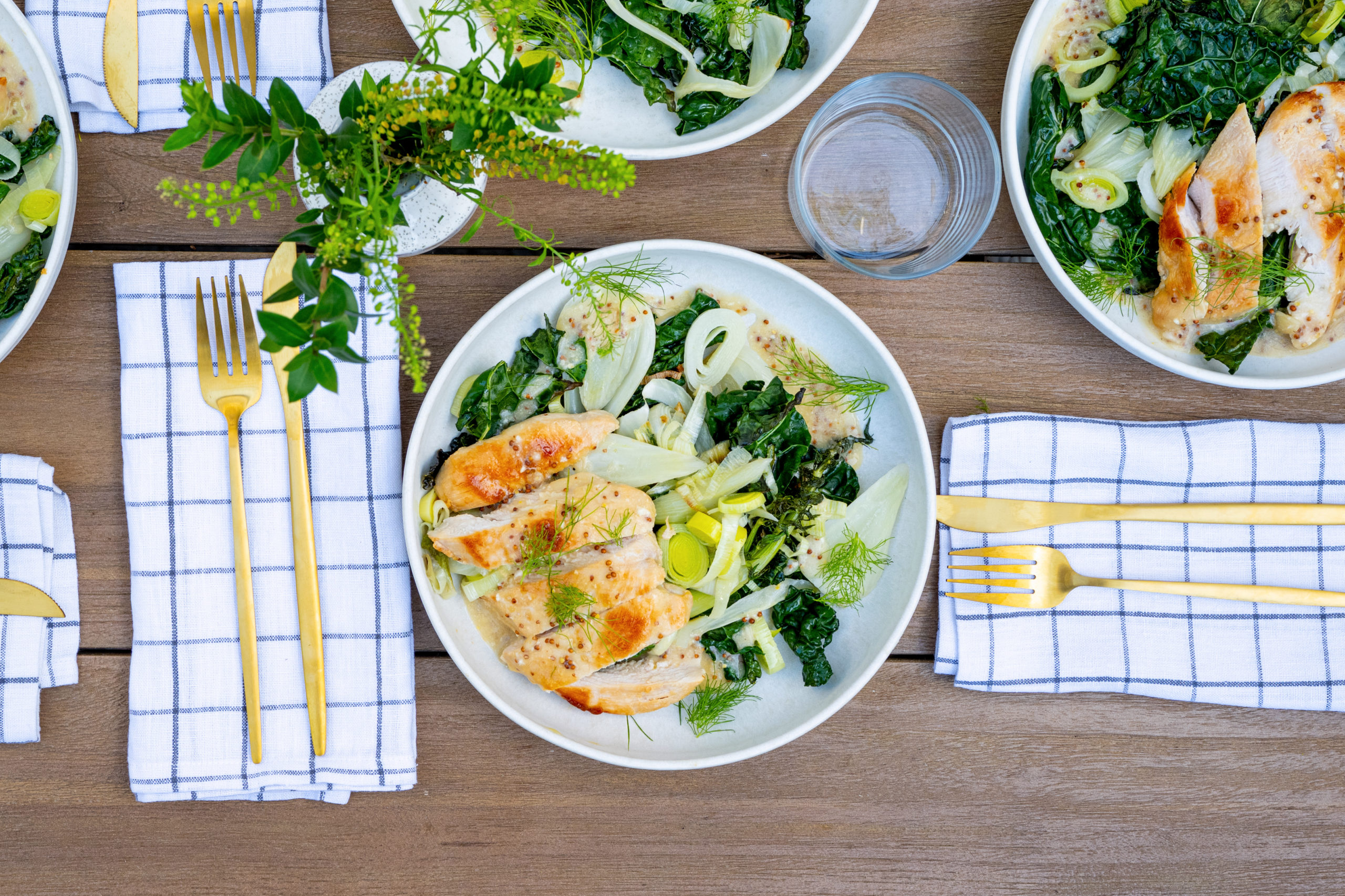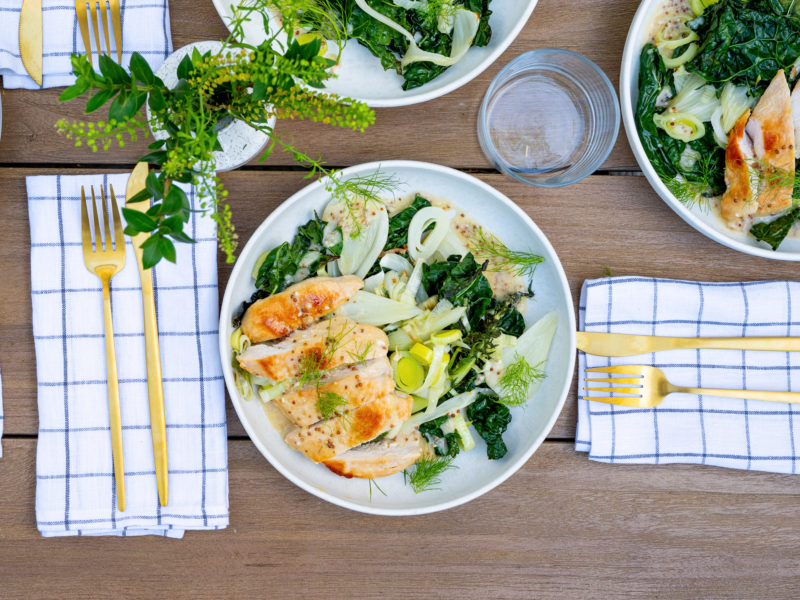
This dish has all the benefits of a healthy serving of daily greens wrapped up with the subtle flavors of fennel and leeks. Paired with the chicken for protein, this is a flavorful dish that comes together almost as quickly as any convenience food, and is sure to leave you feeling both nourished and satisfied.
Improved Cognitive Health
Kale is a healthy nutrient dense food that is a versatile and tasty addition to any meal. Like many leafy greens, is high in antioxidants, Vitamin K, calcium, and folate. Folate and calcium are important for normal bone health. Folate is one of several essential vitamins that plays an important role in DNA synthesis. It’s presence in your diet encourages healthy cell and tissue growth. Additionally, a recent study published in Neurology, showed that consumption of 1 serving per day of green leafy vegetables was associated with slower cognitive decline.
A Note on Fats
This recipe is baked at 400 F, so choosing the right oil is important. We use avocado oil because, in addition to having a beneficial fatty acid profile, can withstand high temperatures without oxidizing. Avocado oil also has a high smoke point (485F). We are concerned with the former, while culinary professionals are concerned with the latter. The point at which an oil smokes (and thus affects the flavor of the food) and the point at which it oxidizes when exposed to heat, can be very different. Smoke point is a metric that is easy to define. Put simply, it is the point at which an oil, when exposed to heat, begins to produce smoke. Oxidation can occur at much lower temperatures. When a fat is oxidized, it produces free radicals that can be toxic and disruptive to the body.
You may have heard of unsaturated and saturated fats. This classification refers to the number of hydrogen molecules attached to a fatty acid. Saturated fats are fully saturated with hydrogen molecules, whereas, monounsaturated, polyunsaturated and unsaturated fats have several hydrogen molecules “missing”. The more hydrogen molecules the fatty acid lacks, the more unstable it is, and the more susceptible it is to oxidation. Most oils are a mixture of saturated and unsaturated fatty acids, so the fatty acid profile is what we need to decipher in order to determine the suitability of a particular oils for cooking.
If you are ready to feel stronger, healthier, and more consistent in the kitchen, join us for The Being Collective 28 Day Challenge. You’ll get 4 weeks of simple and anti-inflammatory meal plans with meal prep instructions, live group coaching calls with Brigid and our team of Registered Dietitians, a 4 week course with our most transformative frameworks and strategies to use food as medicine, 24/7 access to an exclusive support group, and more! Join our next round here.
Creamy Kale Fennel Chicken

Ingredients
- 2 leeks, thinly sliced
- 2 bulbs fennel, cored and thinly sliced
- 1/4 c extra virgin olive oil
- 1/4 tsp salt
- Dash pepper
- 5 c kale, chopped
- 1 lb chicken cutlets
- 1/2 c chicken broth
- 1/4 c plain dairy free yogurt
- 1 tbsp whole grain mustard
Instructions
- Preheat oven to 400 F.
- Add leeks and fennel to a baking sheet and toss with 2 tbsp olive oil, 1/4 tsp salt and a dash pepper. Bake for 40 minutes.
- While veggies are baking, massage kale with 1 tbsp olive oil, and a dash of salt and pepper, and set aside.
- Add kale to the baking sheet with the fennel and leeks for the last 10-12 minutes of baking.
- Heat 1 tbsp olive oil in a large pan, over medium heat.
- Add chicken and sauté until lightly cooked, about 3-4 minutes per side.
- In a small bowl, mix dairy free yogurt, chicken broth and mustard and pour on top of chicken.
- Add the roasted vegetables to pan and continue to cook for 3 minutes.
Nutrition Facts
Creamy Kale Fennel Chicken
Serves: 4 servings
|
Amount Per Serving: 1 serving
|
||
|---|---|---|
| Calories | 434.4kcals | |
| % Daily Value* | ||
| Total Fat 21.6g | 32.3% | |
| Saturated Fat 3.4g | 15% | |
| Trans Fat 0g | ||
| Cholesterol 97.6mg | 32.3% | |
| Sodium 227.7mg | 9.5% | |
| Total Carbohydrate 19.8g | 6.3% | |
| Dietary Fiber 7.4g | 28% | |
| Sugars 7.6g (added sugar: 0g) | ||
| Protein 41.4g | ||
| Vitamin A 36% | Vitamin C 186% | |
| Calcium 11% | Iron 20% | |
* Percent Daily Values are based on a 2,000 calorie diet. Your daily values may be higher or lower depending on your calorie needs.
BeingBrigid
Contributor: Rachel Gollub
Related
Creamy Fennel Kale Chicken
Tired of Feeling Foggy, Bloated, or Depleted?
A complete plan to feel better, built for real life
Over 4 weeks, you'll work with Brigid and her team and get everything you need to reduce inflammation, improve energy, and feel better. No rigid calorie counting. No mystery supplements.
Just a system that makes sense and support that sticks.
Meet The Being Collective
Resources
Join 30,000+ subscribers getting expert guidance to optimize their health and prevent chronic disease
